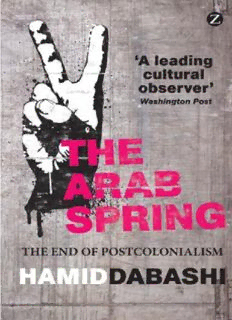
The Arab Spring: The End of Postcolonialism PDF
Preview The Arab Spring: The End of Postcolonialism
About the Author HAMID DABASHI is the Hagop Kevorkian Professor of Iranian Studies and Comparative Literature at Columbia University. Born in Iran, he received a dual Ph.D. in Sociology of Culture and Islamic Studies from the University of Pennsylvania, followed by a postdoctoral fellowship at Harvard University. Dabashi has written twenty books, edited four, and written over a hundred chapters, essays, articles and book reviews. He is an internationally renowned cultural critic, and his writings have been translated into numerous languages. Dabashi has been a columnist for the Egyptian Al-Ahram Weekly for over a decade, and is a regular contributor to Al Jazeera and CNN. He has been a committed teacher for nearly three decades and is also a public speaker, a current affairs essayist, a staunch antiwar activist, and the founder of Dreams of a Nation: A Palestinian Film Project. He has four children and lives in New York with his wife, the Iranian– Swedish feminist Golbarg Bashi. The Arab Spring: The End of Postcolonialism was first published in 2012 by Zed Books Ltd, 7 Cynthia Street, London N1 9JF, UK and room 400, 175 Fifth Avenue, New York, NY 10010, USA www.zedbooks.co.uk Copyright © Hamid Dabashi 2012 The right of Hamid Dabashi to be identified as the author of this work has been asserted by him in accordance with the Copyright, Designs and Patents Act, 1988. Designed and typeset in ITC Bodoni Twelve by illuminati, Grosmont Index by John Barker Cover design: www.kikamiller.com All rights reserved. No part of this publication may be reproduced, stored in a retrieval system or transmitted in any form or by any means, electronic, mechanical, photocopying or otherwise, without the prior permission of Zed Books Ltd. A catalogue record for this book is available from the British Library Library of Congress Cataloging in Publication Data available ISBN 9781780322261 In memory of Edward Said and Magda al-Nowaihi who are not here to see it — and for Joseph Massad and Noha Radwan who will see it through Contents Acknowledgments Preface INTRODUCTION The Arab Spring: The End of Postcoloniality ONE Decentering the World: How the Arab Spring Unfolded TWO Towards a Liberation Geography THREE A New Language of Revolt FOUR Discovering a New World FIVE From the Green Movement to the Jasmine Revolution SIX The Center Cannot Hold SEVEN The End of Postcolonialism EIGHT Race, Gender, and Class in Transnational Revolutions NINE Libya: The Crucible and the Politics of Space TEN Delayed Defiance CONCLUSION The People Demand the Overthrow of the Regime Bibliography Index
Description: